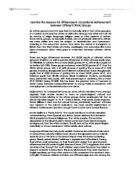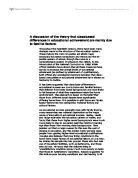Explanations for underperformance by some ethnic minorities have change regularly. Early studies tended to focus on psychological, cultural and material factors relating to the ethnic groups. Some sociologists felt that as ethnic minorities began to ‘fit in’ to life in Britain, their results would improve. David Gillborn’s view was that school factors, particularly teachers’ attitudes and aspects of the school curriculum, are more crucial explanations of different achievement patterns, though home factors have some influence.
Innate Ability is a ‘Home Factor’ that could contribute to ethnic minorities underachieving. Hans Eysenck and Arthur Jensen claimed that American black people had lower intelligence than white people. This was later discredited as the black students tested came from more disadvantaged backgrounds than the white students. The IQ tests set by white psychologists were likely to favour members of white middle class cultures.
Language differences may partly explain the lower educational attainments of some ethnic-minority children born abroad. Bangladeshis came to Britain recently and at the time of the Swann Report were the lowest achieving group. Newly arrived black Caribbean’s experienced difficulties in having their written work accepted, as their West Indian dialect had grammatical differences from Standard English. Bernard Coard (1971) suggested that white teachers often thought that such children were stupid because they failed to respond correctly to instructions. This is usually because they were treated as English speakers, yet they often could not fully understand the teacher’s form of English. However, children of Indian and Chinese origin are now among the highest achieving groups, this suggests that language problems affect only recent immigrants.
The Swann Report suggested that the more tightly ‘knit’ Asian family structure, compared with the typical Afro-Caribbean one, might be responsible for higher levels of achievement in some Asian groups. Few women of southern Asian origin are single mothers, whereas the occurrence is common among Afro Caribbean’s and increasingly so among whites. Ken Pryce (1979) observed that Afro-Caribbean family life in Britain can be ‘turbulent’. New Right commentators associate the children of lone parents with underachievement and other forms of deviance. When mothers bring up children alone they are often working, this means that their children may receive inadequate parental encouragement and supervision, unless there is support from relatives or friends.
There is research showing the links between low parental income and children’s achievement in education. In Britain, unemployment rates for non-whites are generally higher than for whites. The relative poverty of many ethnic-minority parents means that their children are unlikely to attend independent schools, have private tuition or have home computers. Bhatti (1999) found that, because of financial constraints, some Asian students left the education system sooner than their parents would have liked. Despite education maintenance allowances and university loans, low family income is a significant influence when considering staying on to do A-levels.
An ethnocentric curriculum is a school syllabus that has been designed for the dominant culture and forgets the cultures of ethnic minorities. In 1971, Bernard Coard observed the absence of black literature, history and music in the British curriculum, and of positive images of black people in school books. He felt that this and the many negative associations of the word ‘black’ in the English language were likely to create low self-esteem in Afro-Caribbean children and give them the feeling that school subjects had little relevance to their lives. The multicultural education movement attempted to encourage the teaching of world religions and the addition of black and Asian writers in literature. However, since 1988, the national curriculum has reversed by using large proportions of Christian teaching and the study of Shakespeare and pre-twentieth century authors. Ethnic-minority groups have addressed this problem by setting up Saturday and supplementary schools to teach aspects of their own cultural heritage.
Obviously, racism is another reason why some ethnic groups underachieve in the education system. In 2000, the British Crime Survey found that 60% of Asian adults were worried about racially motivated attacks. This fear can also affect school attendance. Gillborn (1990) found that, at the comprehensive school he researched, racist name-calling by white students within school was an almost daily experience for Asian students. Physical attacks were also common and teachers responded inadequately. Asian students may respond to the threat by banding together for mutual protection, leading to accusations of keeping to themselves. Ethnic-minority parents are less likely than white, middle-class parents to send their children to a better school some distance from home. Their local school tends to be preferred because it is in a familiar neighbourhood, perhaps making racial harassment less likely. They may also lack sufficient cultural capital to recognise the best-quality schools.
Bernard Coard (1971) accused teachers of underestimating the abilities of Afro-Caribbean’s. Before 1988, when league tables began to pressurise schools to obtain optimum results, there was evidence of teachers directing black students into sports and steel bands rather than academic study. Gillborn and Youdell (2000) noted that an unequal number of black students in the schools they studied were entered for foundation tiers in GCSEs, meaning that they could only achieve C grades or below. Therefore, they would be unlikely to progress to A-levels. The decisions about entering students for GCSEs were based on teachers’ estimates of the students’ ability and might have been influenced by stereotyping.
Overall, there are many factors that contribute to educational achievement by different ethnic groups. I feel that factors within the education system like the ethnocentric curriculum and prejudice in schools are the biggest problem because they occur everywhere. Also, it mean’s that ethnic groups are stuck in a stereotype that needs to be changed otherwise they have no chance of achieving their targets.







